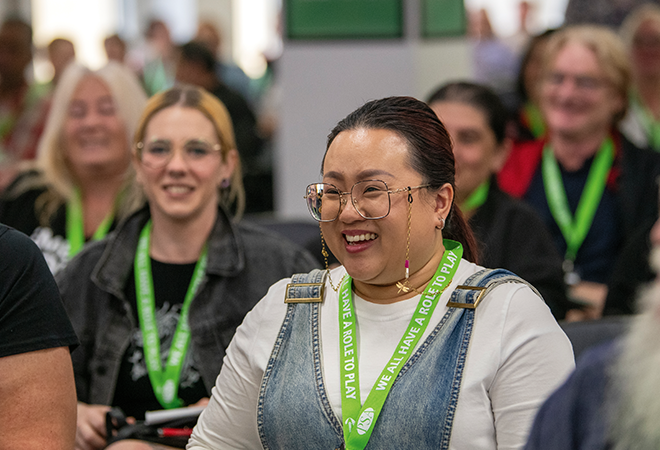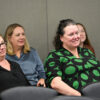The 2023 PSA CPSU NSW Mental Health Conference examined strategies to deal with a workplace scourge.
Opening the PSA CPSU NSW Mental Health Conference, General Secretary Stewart Little talked about the union’s goal of “a comprehensive mental health strategy right across the public sector”.
Mr Little said decent workplace health and safety (WHS) policies were needed to accommodate workers’ mental health in areas such as schools, where staff faced violence “sometimes daily”.
The Mental Health Conference was the first held at PSA House since 2018. It attracted more than 100 members from the union’s diverse membership. Entitled We All Have a Role to Play, the conference featured a mix of speakers and presenters looking at how union members can support each other at work.
The first speaker was the Federal Assistant Minister for Mental Health and Suicide Prevention, Emma McBride. Ms McBride, the MP for the Central Coast seat of Dobell, praised the union movement for working with government to “remove the stigma on talking about mental health”, particularly in male-dominated industries such as construction and mining.
While proud of the Albanese Government’s achievements in the mental-health sphere, Ms McBride admitted there was still some work to be done. She acknowledged there is still a shortage of psychologists throughout the country. This was particularly prevalent in regional areas and was an issue the Federal Government was addressing.
She said there was still work to be done on toxic behaviour towards women in Australian workplaces, including her own parliamentary chamber in Canberra. Referring to the State Parliament and MPs’ electoral offices that are covered by the PSA, Mr Little brought up the “power imbalance” that can adversely affect staffers.
Emma Boucher is a Mental Health and Wellbeing Facilitator and Senior Psychologist with the Mental Fitness @ Work program at HSE Global risk management consultancy and the speaker after Ms McBride. Her presentation touched on intervening with potential suicide in the workplace.
She discussed stress, which she pointed out is a normal response to enable us to cope with situations around us. However, she pointed out an excessive, overwhelming level of stress is not normal and can actually result in burnout.
“Burnout is a syndrome and is quite specific to workplace stress,” she said.
She said too much stress can result in you “running on empty” affecting productivity, a decline in performance, apathy and, ultimately, mental illness. For many, she said excessive drinking is a way to cope with stress.
One solution Ms Boucher discussed is using a Mental Fitness Framework to help manage stress and burnout. She said changing workplace culture can be a slow process; but encouraged attendees to talk about mental health when back in the office or onsite.
The next presentation on the agenda was delivered by Lachlan O’Neill, Principal Inspector with SafeWork NSW Psychological Health.
Mr O’Neill discussed the specific hazards Public Sector workers face, citing a 65 per cent increase over five years for psychological injuries among government workers.
In addition to the suffering faced by those with these industries, he said the typical mental health-related workers’ compensation claim costs taxpayers $100,000, which is more than the typical claim for a physical workplace injury. He said this figure may be high, but it still does not take into account lost productivity and the additional cost of recruitment that results when a worker leaves a role.
He said a key way to lower the risk in your workplace is to “learn about risk factors, especially if you or a colleague face these issues”. By looking out for risks, a resolution is more likely.
Moving onto workplace bullying, Mr O’Neill acknowledged that “everyone will have received training on what it is” and that systems are in place to prevent bullying in public sector workplaces. He said contrary to the stereotype, bullying in places of work is not due to “workplace psychopaths”.
“Most of the time it is because of a power imbalance, the pressure they are under or systemic factors in place,” he said. “Often it can be addressed by putting measures in place rather than the dismissal of parties.”
However, regardless of the strategy, he said workplace bullying “needs to be dealt with quickly and efficiently”.
Mr O’Neill said with WHS regulations having recently been expanded to include psychosocial risks in the workplace, early intervention using these rules is important.
“People often come to us when everything has already exploded,” he said.
He urged those in attendance to develop relationships with managers, who, while they may not be able to deal with psychosocial hazards, will know the difficulties these issues create.
Mr O’Neill praised the role of Health and Safety Representatives (HSRs) and their legislated right to prevent workers being placed in hazardous situations.
“Putting a worker at risk of injury is unreasonable,” he said.
HSR training is available through the PSA CPSU NSW.






Jane Hogan from Aware Superannuation followed Mr O’Neill, discussing her employer’s Mental Health Assist program for members. The telephone service offers assistance on mental health matters to Aware Super members, and they are not required to get a medical referral to take advantage of it.
Next at the conference podium was Ali Walker from The Change Room, an organisation that encourages people to improve their physical and mental health by exploring better practices used in high-performance sports environments.
In a light-hearted, engaging presentation, Dr Walker discussed how to “increase your wellbeing and life expectancy”, pointing out that despite being an invisible condition, the effects of social isolation can be devastating.
“Loneliness is worse for us than smoking, obesity and substance abuse,” she said. “We need to know how to diagnose loneliness in people.”
Dr Walker said strong ties to colleagues and friends is better for longevity than an improved diet and exercise. She discussed with the audience methods on how to read others’ signs of social engagement to improve their social skills.
Dr Walker talked about the evolution of mental health treatment in recent years, something that had had a positive effect on workplaces.
She said today’s work culture has evolved with people treating colleagues with increased concern thanks to “an explosion of research into the culture of belonging”.
The conference may have touched on quite serious subjects, but it ended on a high note with former reality TV star Magic Mike, who was at pains to tell attendees he was not the stripper of the same name, but rather an entertainer who performed magic tricks with his clothes on.
A survivor of severe depression, Mike made his name on Australia’s Got Talent. His show used magic tricks such as switching cards to tell his story of overcoming suicidal thoughts to travel the world and entertain people.
People were brought up from the audience to participate in his tricks as he discussed his recovery and the strategies he uses to address depression and anxiety.
“Mental health is a huge issue in all our workplaces,” said PSA CPSU NSW President Nicole Jess after the event. “As a union, we are proud to be at the forefront of the fight to ensure any mental-health issues that affect our members are addressed properly.
“We All Have a Role to Play is more than a catchy conference theme. It goes to the very fundamentals of what it is to be a union member. We look out for each other, we support each other and we listen to each other.
“Just as we work together for better wages and conditions, we work together to create workplaces where we look after each other’s mental health, and in turn that of our family and friends.
“It was wonderful to see a room full of members at conference listening to an excellent array of speakers and taking back this knowledge to help them, their colleagues and even their families better navigate any mental health issues confronting them.
“We look forward to similar events in the future.”
















Leave a Comment
Your email address will not be published. Required fields are marked with *